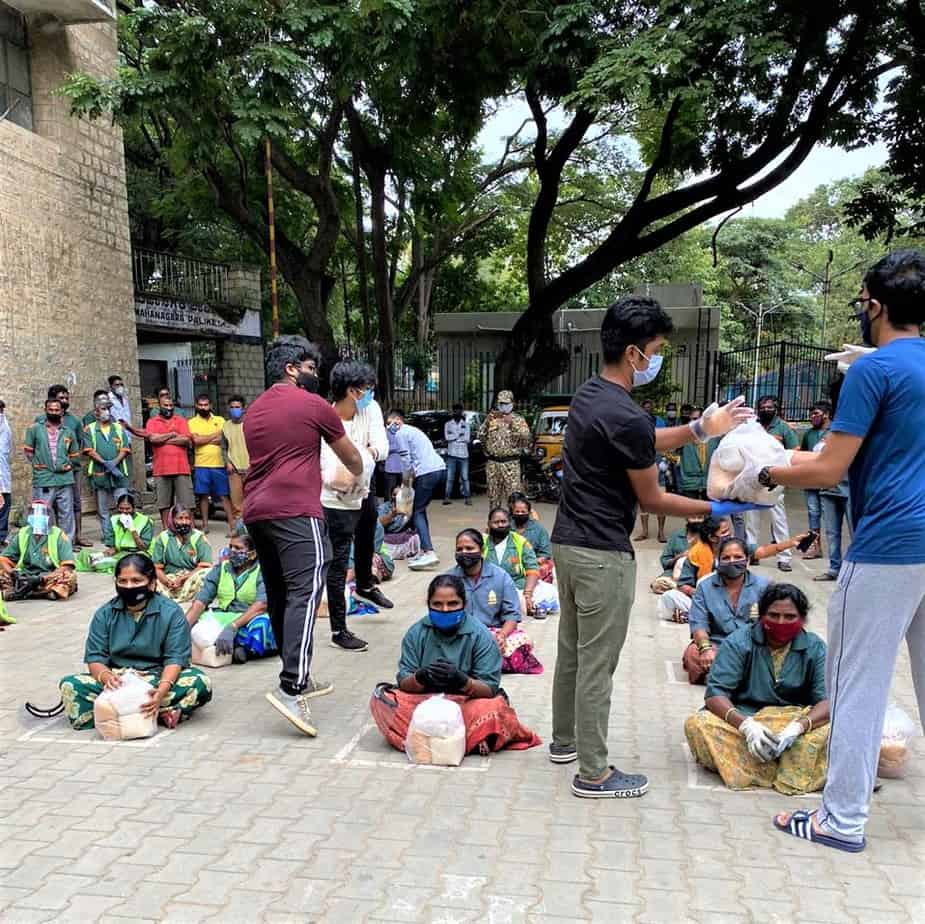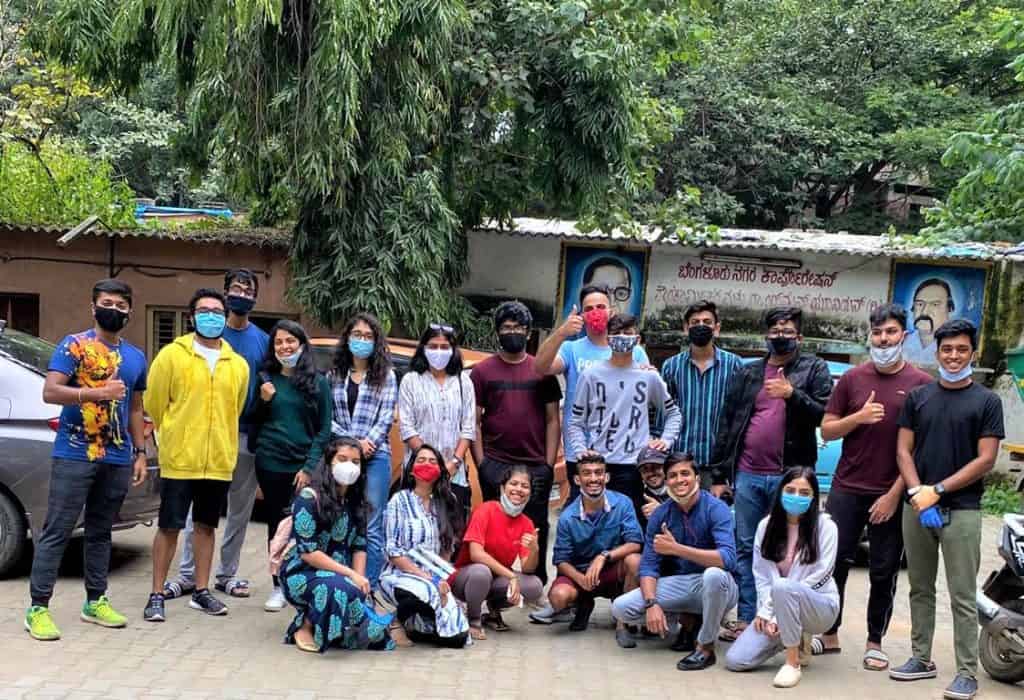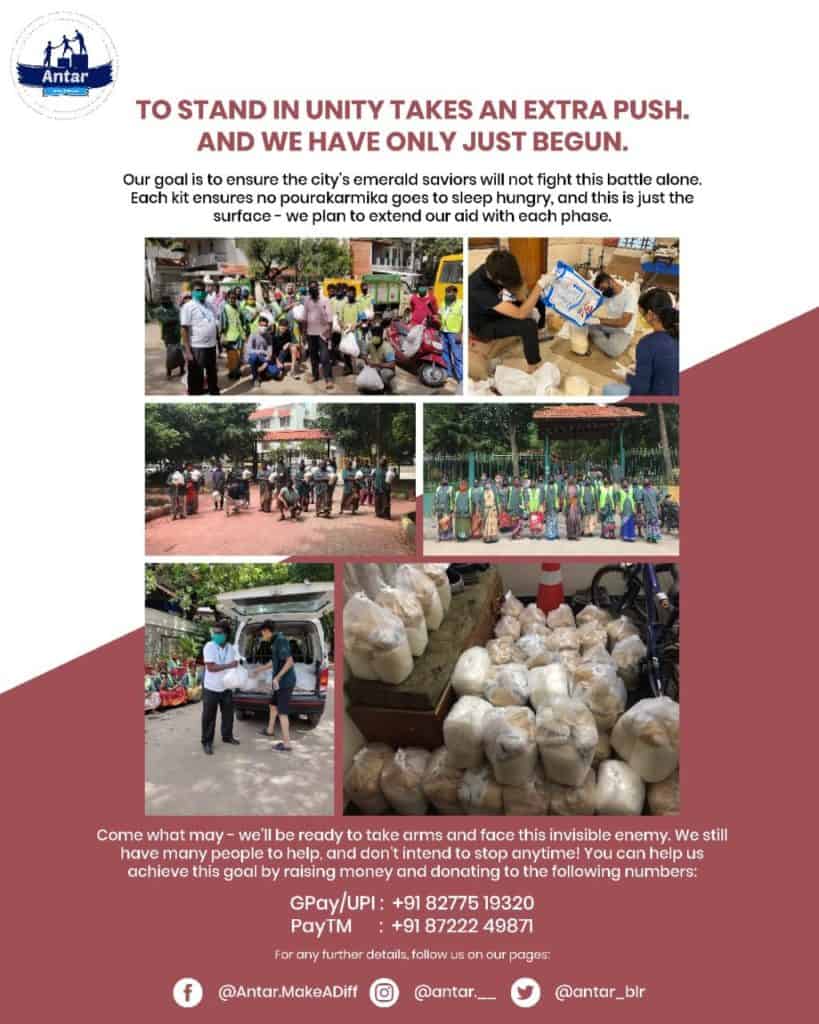COVID-19 is far more than a health crisis; it has affected our economy and livelihoods, and has challenged our society overall. We have been applauding those in the healthcare sector, but few think of workers who’ve been risking their lives to maintain sanitation at the frontlines — cleaning our streets, ensuring that we don’t catch the virus — all with sub-optimal working conditions and lack of health cover.
To address this issue, Antar, a group of college students from Bengaluru and other cities, came together to provide ration and relief kits to pourakarmikas and their families. We have covered over 350 pourakarmikas’ families in Bengaluru so far, by raising funds of around Rs 1.5 lakh. The relief kits were provided through seven drives conducted in six wards including HAL, Indiranagar, Malleshpalya and Jogupalya.
Here’s how we went about it.
Understanding the challenges of BBMP workers
Priyanka Harish, a member of the Antar social media team and a student at Christ University, says, “On witnessing the migrant crisis, we wondered about the well-being of pourakarmikas and spoke to them to know more. The results were disturbing.”
We found that:
- Pourakarmikas’ already minimal wages were being delayed
- They barely had access to good quality masks and gloves
- No sanitisers were being provided on a regular basis
- Washrooms and proper shelter that are required for changing clothing/during rains was lacking
- Their children lacked books and stationery
- There was no proper office set up
- Women workers had no access to sanitary products, and some used dirty clothes due to lack of alternatives
Priyanka recounts, “While many women we spoke to were worried for their safety, they said they were helpless and had to continue working to provide for their families. Speaking to these brave women was a humbling experience; their resilience was inspiring. This was when we, as students, realised it was time we took initiative to help those who have been helping us everyday.”
Providing relief kits
From May 28, students from colleges across India came together to launch a social media campaign to raise funds for buying food grains for the workers. In Bengaluru, students from colleges including Mount Carmel College, PES University, Manipal Institute of Technology, NIFT, Azim Premji University, Reva University and more, took part.
We hosted tutorials and virtual concerts to reach as many people as we could. Student artists such as Pradish Kapur, Anushree Bhat and Lalitha Alwan played a key role in helping raise funds by selling digital prints, wallpapers and other artwork.
Below is some of their artwork.
The response from our communities and friends to the fundraising initiatives has been overwhelming. With the funds, we started off by providing pourakarmikas with ration (rice, dal and atta). In recent times, we have increased our scope to provide sanitary pads, and to meet the educational needs of the workers’ children.

More recently, volunteers Khushi and Krithi, 12th grade students at DPS-North who have been working on Project MENstruation – an initiative to educate men and boys about menstruation while providing women from low-income families with sanitary pads – helped distribute ration kits and sanitary pads to the workers. The two have distributed 2,000 sanitary napkins so far.
Something that started off as a humble initiative by a small group of students now has around a hundred people from different colleges working to help those in need.

Dharani Jampani, a student from St Joseph’s College of Commerce who has been associated with the cause for the past two months, says Antar plans to help other sections of society too. She says, “Serving our BBMP workers is only the first project. Antar now has a systematic structure of a social media marketing team, content development team, groundwork team and fundraising team. We would like to help as many groups in society that are impacted by these uncertainties.”
You too can be part of the initiative
As the youth of the nation, we have a voice which we must use to speak out about the issues in our society. As important as it is to pressure the authorities to ensure that sanitation workers have better working conditions and are treated with dignity, we should also try and make their lives as easy as we can.
It may not be possible nor safe for everyone to work on the ground, but that is only one of the many ways you can help. You can donate to support our work – find the details for our Google Pay and PayTM accounts in the poster below.

Or, you can campaign like many of the artists we teamed up with. So get creative and make a difference!







Risha very proud of you …. keep the good work going. All the very best in your endeavours….
So very proud of you Risha, keep up the good work !!